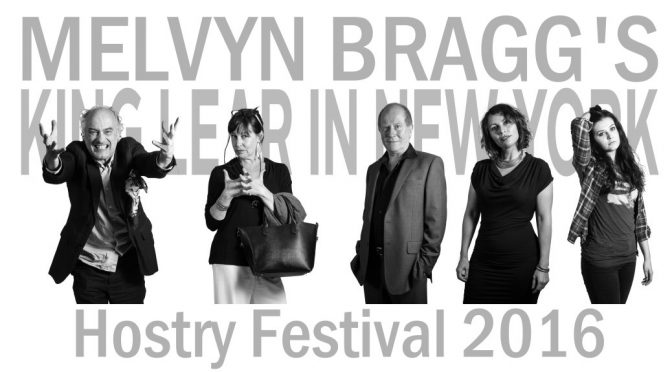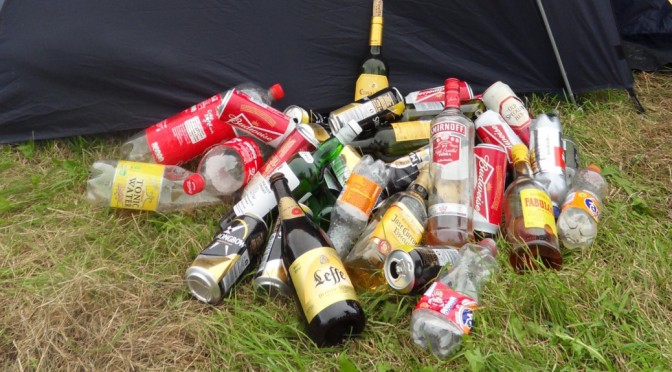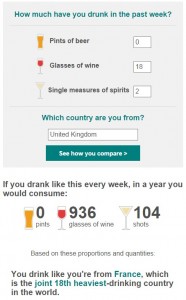King Lear in New York, Melvyn Bragg
The 2016 Hostry Festival production of the 1994 original play by Melvyn Bragg has been revised by Melvyn with suggestions by Stash Kirkbride, who directed this version, and one of the principal actors, Peter Barrow. The result is a play that positively zips along, in just 90 minutes without a break, with two outstanding performances from Louis Hilyer playing Robert and Rebecca Chapman as Jackie, who set the depth and drama of Shakespeare against the gossip and glamour of Hollywood.

The other starring role in King Lear in New York goes to drink, for it is a dysfunctional family tragic-comedy with father, daughter, and brother, ex-wives and ex-lovers, and a prominent role for the not so on-off relationship with alcohol.
Modelled on Richard Burton’s own demons – drink and women, as Bragg admits, having also authored his biography, Richard Burton: A Life. Burton said, himself, that he turned to drink to “burn up the flatness, the stale, empty, dull deadness that one feels when one goes offstage.”
“I was fairly sloshed for five years. I was up there with John Barrymore and Robert Newton. The ghosts of them were looking over my shoulder.” – Hellraisers: The Life and Inebriated Times of Richard Burton, Richard Harris, Peter O’Toole, and Oliver Reed, by Robert Sellers, p145 (2009)
Burton of course, never played King Lear, only King John, and whilst wanting to play Macbeth to spite Laurence Olivier, in a film version, never achieved that either. This play imagines a type of Burton before opening King Lear, albeit in off-off-Broadway.
Melvyn was in town on Wednesday to see the new version and take a Q&A on it. He was asked about the cutting and editing process, that included the removal on one character in their entirety. Personally, I don’t feel the daughter’s addiction is fully sold to us, indeed there’s enough broken family angst between father and daughter, even without her addiction to drugs paralleling her father’s to drink. Melvyn was keen to present her fragility and yet, unlike Lear, portray redemption and rescue.
There is a cracking score of music and storm effects, projected New York backdrops, vintage ‘brick’ phones and, I think I spotted a Dalwhinnie whisky centre stage, alongside the Jack Daniels and plenty more drink besides, on the permanently-on-stage cocktail mini-bar. More likely to have been cold tea or coloured water than the marvellous amber single malt nectar. Peter Barrow holds the stage alone at first, almost making one wonder if we are watching a 1980-90s Wall Street drama.
Before any chance of settling in, there was an early dramatic entrance by Robert, amidst a cacophonic clatter and clink, rather alarming the back row, and one wondered whether this was going to be a cross between Withnail and I and Waiting for Godot, or perhaps even Whisky Galore! The entry brings wine and JD to join the already well-lubricated ‘actor-playing-an-actor’ on stage who is on the knife-edge of a return to fame or floundering as a washed-up thespian wannabe.
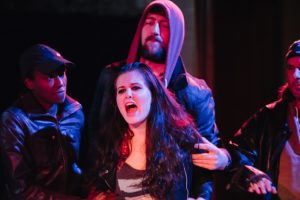
As if his drink and acting problems weren’t enough, he has broken relationships with his daughter Julie played with teen-twenty angst by Nina Taylor and ex-lovers to manage. Rebeccas Aldred and Chapman squared off with each other, arguing over Robert, his career, and his affections. Aldred was an excellent foil to Chapman, an in her role was equally torn between her allegiances and hopes for Robert.
All that, and King Lear too? A knowing audience would be left wondering how far the play within, or rather before, a play will ape Shakespeare’s own and be a full-on tragedy and no mere storm in a whisky glass.

King Lear faced the challenge of dividing his realm between his three daughters, with the lion’s share going to the one who loved him most. In this play, there are more than three rival and competing loves. Dialogue and drama swing between the paternal love of his daughter, fraternal to his brother, and erotic – and there are a few good speeches about that in the play with regard to ex-lovers. Excusing his past loves as natural processes, defending the self-acknowledged Lotharian love rat that he was/is, he expounds on ‘what is love?’ Or rather, on sex – “Sex is like emptying your bladder.” Though, the full “repertoire of love [is] grander than a cathedral organ.”
Then there’s the titanic struggle between the allure of Hollywood and the age-old stage actor’s dream of Shakespearian challenge. A challenge, that the role of Robert is simultaneously tempted and tortured by, not to mention taunting by his ex-lovers. Whether an actor will ‘die’ on stage is part of the attraction he says. But one day and one death on stage would also kill his Hollywood resurrection, the others counter with. In the play’s first outing in 1994, one reviewer described Kate O’Mara in Jackie’s role as “horny for disaster”, Chapman, instead, seems to desire either his success or failure, but nothing in-between.
Life is an act. “He is him when he is most someone else”, the actor’s brother says, even the agent has to ‘act’ on his behalf. We are all the great pretenders, performing our ‘lie-dentities’. Whether in life or on the stage, we are actors in our own dramas.
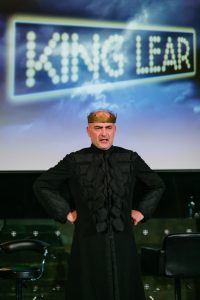
This drama is part sitcom, part tragedy, but fully engaging. Torn between multiple loves, do we love it? In the context of the play, it might be pushing it to say addictive, but the editors seem to have got the revision just about right. Quitting Shakespeare is as hard as quitting drink, it is as much a drug to its proponents as the skin-deep glamour and glitz of Hollywood celebrity. The play expertly channels King Lear through the funnel of boozy dysfunctionality of its players. Louis Hilyer is Shakespearean and Rebecca Chapman revels in exuding the worst of Hollywood and TV chat shows, even reeling in the excellent Rebecca Aldred as Bett. The play is certainly worth a second visit after 20 years and maybe even a second visit this week. Norwich’s Hostry Festival event is certainly off-off-off Broadway, and deserves greater visibility.
